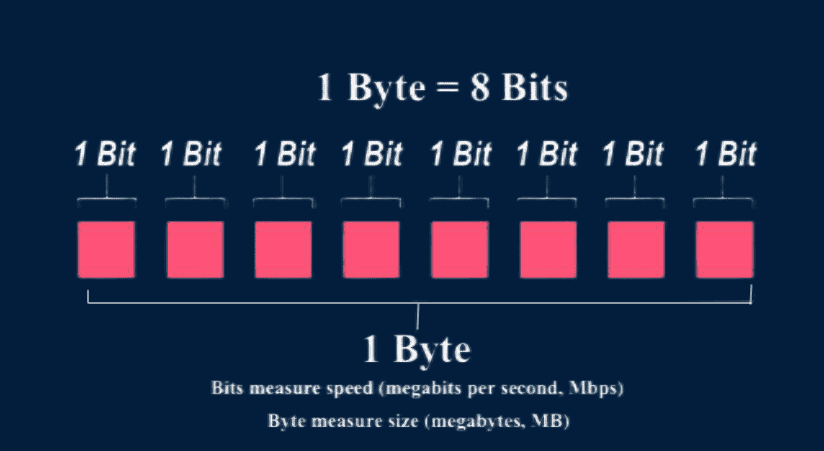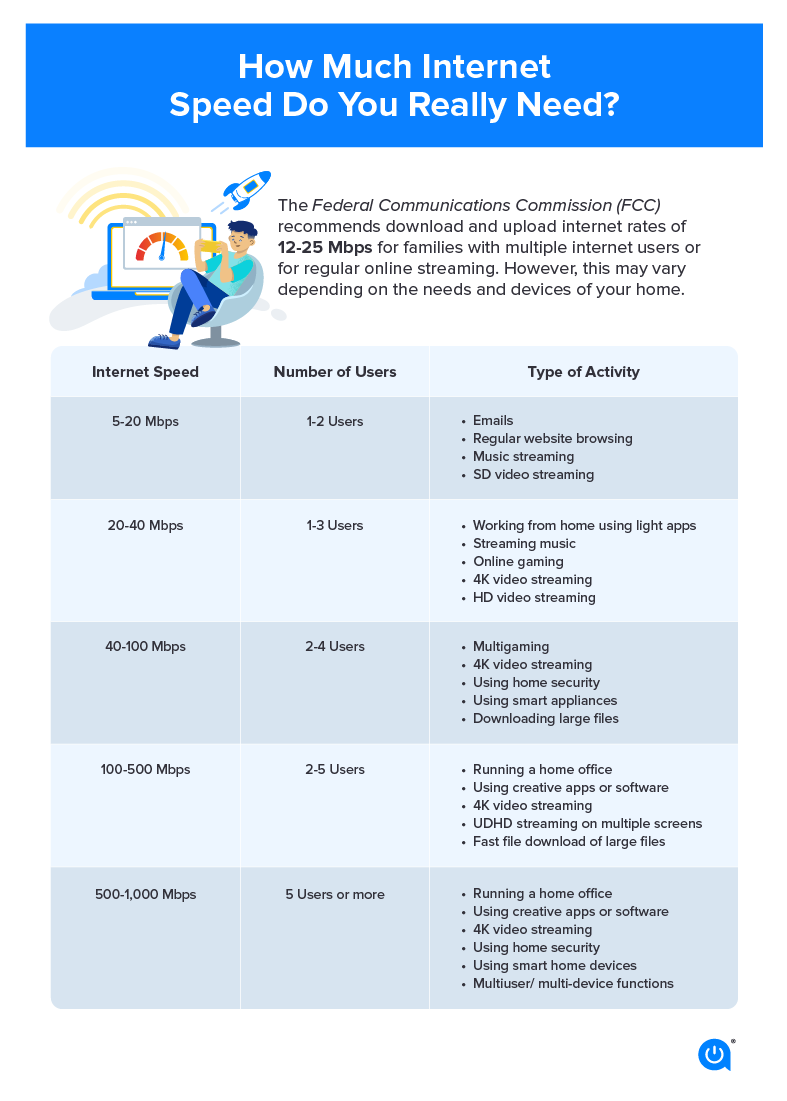Discovering the Relationship Between Megabits Per Second and Download Speeds
Discovering the Relationship Between Megabits Per Second and Download Speeds
Blog Article
Just How Megabits Per Second Impact Your Online Activities
The idea of megabits per second (Mbps) plays an essential function fit our on-line experiences. As electronic activities proliferate, comprehending the ramifications of Mbps on streaming, video gaming, and video conferencing ends up being significantly vital. Greater Mbps can improve performance and decrease disruptions, while insufficient rates may cultivate disappointment and inadequacy. Examining your home's particular needs in connection with these rates is essential, especially as multiple tools contend for bandwidth. Yet, the nuances of how Mbps impacts different online activities warrant additional expedition, especially as our reliance on digital connection remains to evolve.
Recognizing Megabits Per Second
When considering internet speed, it's vital to comprehend the principle of megabits per second (Mbps), which offers as a conventional dimension for information transfer prices. This metric quantifies exactly how much data can be transmitted over an internet link in one second, providing a clear understanding of efficiency capacities - Megabits Per Second. For context, one megabit amounts to one million little bits, and Mbps is generally utilized to share transmission capacity for various on the internet tasks
A greater Mbps indicates a quicker internet connection, allowing individuals to do jobs such as downloading documents, browsing web sites, and participating in on the internet pc gaming much more successfully. For instance, typical surfing calls for around 1-5 Mbps, while streaming high-definition video clip may demand 5-25 Mbps. Understanding these requirements is crucial for establishing the appropriate web speed required for certain tasks.
In addition, the number of tools linked to a network can impact overall efficiency. Numerous customers streaming, video gaming, or downloading and install at the same time can strain readily available bandwidth, resulting in slower rates - Megabits Per Second. Reviewing individual online behaviors and requirements is essential in choosing a net strategy that lines up with one's needs, ensuring a seamless digital experience
Streaming and Buffering Issues
Streaming high-def material has actually ended up being a staple of modern on-line home entertainment, yet it is frequently come with by frustrating buffering problems. These disturbances can considerably take away from the seeing experience, resulting in discontentment and possible loss of target market involvement. Buffering takes place when the information transferred from the streaming service is not received quickly enough to preserve a smooth playback, typically because of inadequate internet speed determined in megabits per second (Mbps)

In addition, real-time streaming can be impacted by network congestion, which takes place when several devices share the exact same bandwidth. Consequently, enhancing connection speed and making sure appropriate Mbps is crucial for a seamless streaming experience. As streaming solutions continue to develop, understanding the impact of Mbps on buffering concerns stays critical for consumers seeking undisturbed home entertainment.
Online Video Gaming Performance
The influence of net speed on online tasks expands past streaming, significantly influencing online video gaming performance. In competitive pc gaming, low latency and high data transfer are critical for a seamless experience. A quick link reduces lag, permitting players to react swiftly to in-game events, which can be the distinction in between victory and loss.
Bandwidth, measured in megabits per second (Mbps), plays an essential duty in supporting multiple tools and video gaming platforms concurrently. Inadequate transmission capacity can see result in went down links or decreased game top quality, adversely influencing gameplay. For instance, on-line multiplayer games require considerable information transfer, specifically during peak pc gaming you can try this out hours when various players are online.
Furthermore, the type of video game can also dictate the necessary web rate. Busy first-person shooters demand greater speeds to keep responsiveness, while turn-based method video games may work fairly well on reduced speeds. As on the internet video gaming remains to evolve, with raising visual integrity and more complex multiplayer environments, the need for higher Mbps will only escalate. Consequently, gamers must guarantee they have adequate net speed to improve their video gaming efficiency and overall experience. Purchasing a durable internet link is crucial for gamers aiming to optimize their performance and pleasure.
Video Conferencing Quality
In today's electronic landscape, video conferencing top quality is greatly influenced by internet rate, specifically in regards to bandwidth and latency. Top quality video calls call for enough data transfer to send audio and video clip data perfectly. Commonly, a minimum of 1.5 Mbps upload and download speeds is suggested for conventional interpretation video clip, while high-def video clip conferencing generally requires at least 3 Mbps.
Latency, or the delay between sending out and getting data, likewise plays a vital function in the user experience. Low latency makes certain that discussions flow naturally without unpleasant pauses or disturbances. Preferably, latency needs to be below 150 nanoseconds for efficient interaction. Greater latency can bring about resemble, lag, and disjointed communications, which can impede collaboration and involvement during conferences.
Moreover, numerous participants in a video meeting can strain offered bandwidth, requiring also greater rates. Network congestion, typically brought on by simultaneous activities like streaming or downloading, can additionally break down video clip high quality. Hence, for companies counting on video conferencing for remote cooperation, recognizing the connection in between megabits per total and second interaction quality is necessary for keeping performance and enhancing digital communications.
Choosing the Right Internet Plan
Selecting an ideal net strategy is critical for making certain optimum efficiency in different online activities, particularly in setups that demand high transmission capacity, such as video conferencing and online video gaming. Megabits Per Second. When considering a net plan, it is necessary to assess both the rate and data allowance to match your specific usage needs
For houses with several customers involving in synchronised activities, a strategy offering higher megabits per second (Mbps) is advised. Typically, a minimum of 25 Mbps appropriates for conventional streaming and surfing, while plans surpassing 100 Mbps are preferable for even more extensive tasks. Furthermore, take into consideration the nature of your online tasks; video conferencing needs a minimum of 1.5 Mbps post rate, while on-line gaming might need a lower latency yet consistent link.
It is additionally important to examine your data cap. Endless data plans can avoid strangling and disruptions, particularly if hefty use is expected. Research service carriers in your location, as accessibility and pricing can vary. By thoughtfully picking a net strategy tailored to your demands, you can improve your on the internet experience, making certain smooth, nonstop accessibility to your preferred activities.
Final Thought
To conclude, the relevance of megabits per second (Mbps) fit on-line tasks can not be overemphasized. Greater Mbps assists in have a peek at this website smooth streaming, lowers buffering, enhances video gaming experiences, and ensures high-grade video conferencing. Alternatively, insufficient data transfer can bring about discouraging disruptions and reduced performance across different tasks. An extensive understanding of specific or household Mbps demands is essential for choosing an appropriate internet plan that effectively supports diverse online tasks and customer needs.

Typically, a minimum of 25 Mbps is suitable for standard streaming and browsing, while plans going beyond 100 Mbps are more effective for even more extensive tasks. Additionally, consider the nature of your online tasks; video conferencing needs at least 1.5 Mbps post rate, while on the internet pc gaming might need a lower latency but regular connection.
Report this page